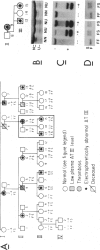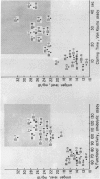Abstract
Maximum likelihood analysis of linkage between antithrombin III (ATIII) DNA polymorphisms and ATIII deficiency in a large Utah kindred suggests that thrombotic disease in this family is caused by a dysfunctional ATIII gene. ATIII-deficient family members were identified on the basis of: (1) reduced anticoagulant activity and (2) the presence of an electrophoretically abnormal inhibitor molecule in their plasmas. Affected individuals have two copies of the ATIII structural gene, and both alleles appear normal at the resolution of whole genome Southern blotting. However, family studies revealed statistically significant cosegregation of ATIII-deficiency trait and a particular ATIII DNA polymorphism haplotype (lod = 3.35; theta = 0.0); this result is consistent with the presence of a dysfunctional ATIII gene on a chromosome of the +, S haplotype.
Full text
PDF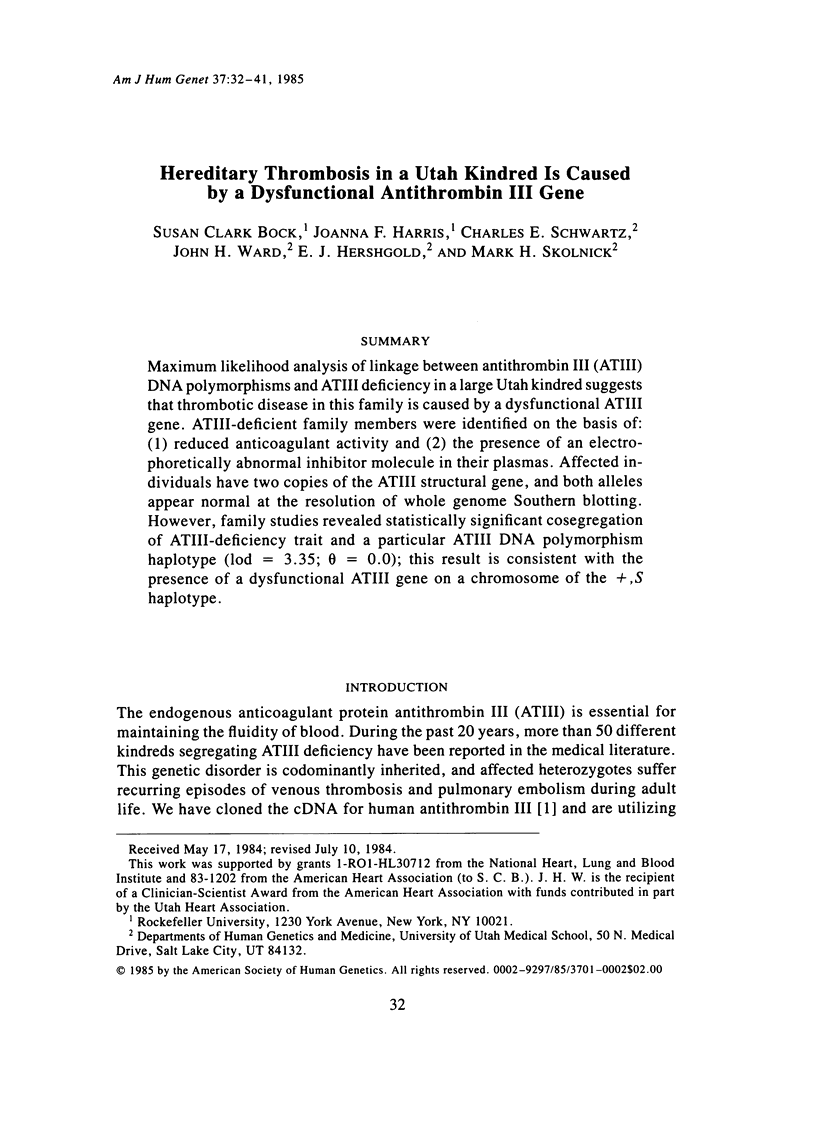
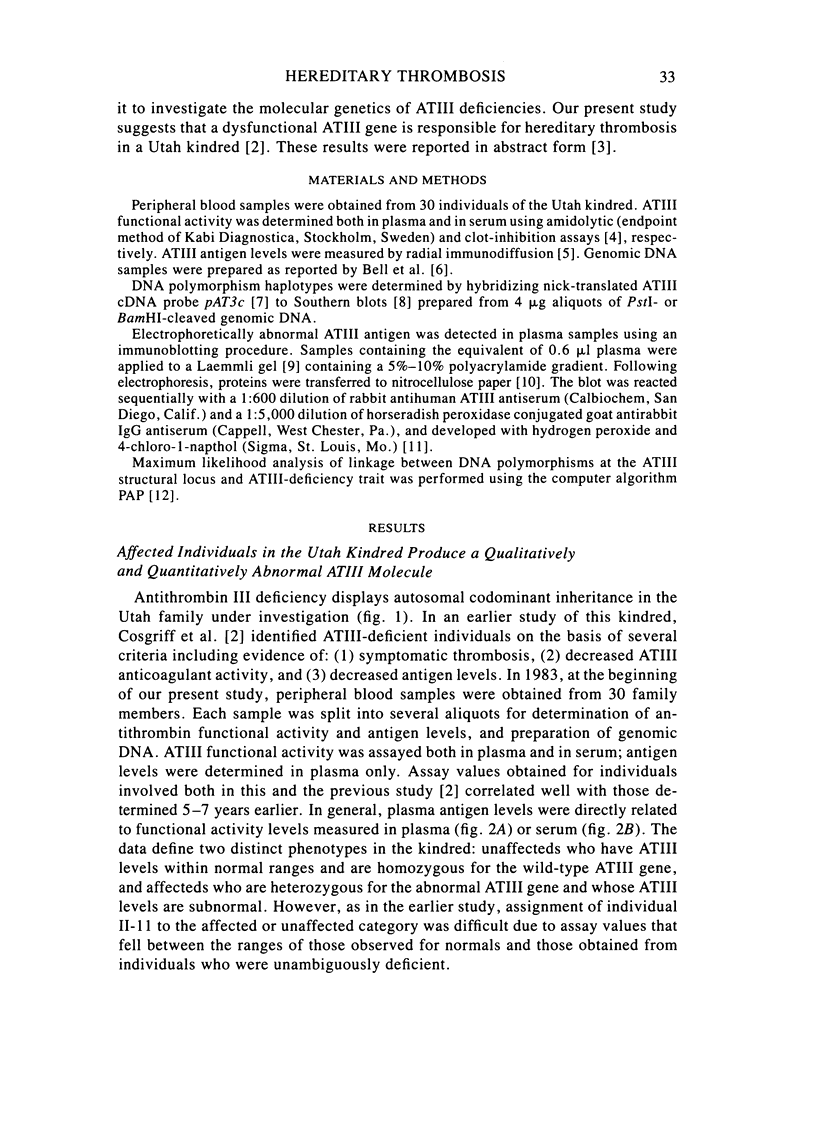
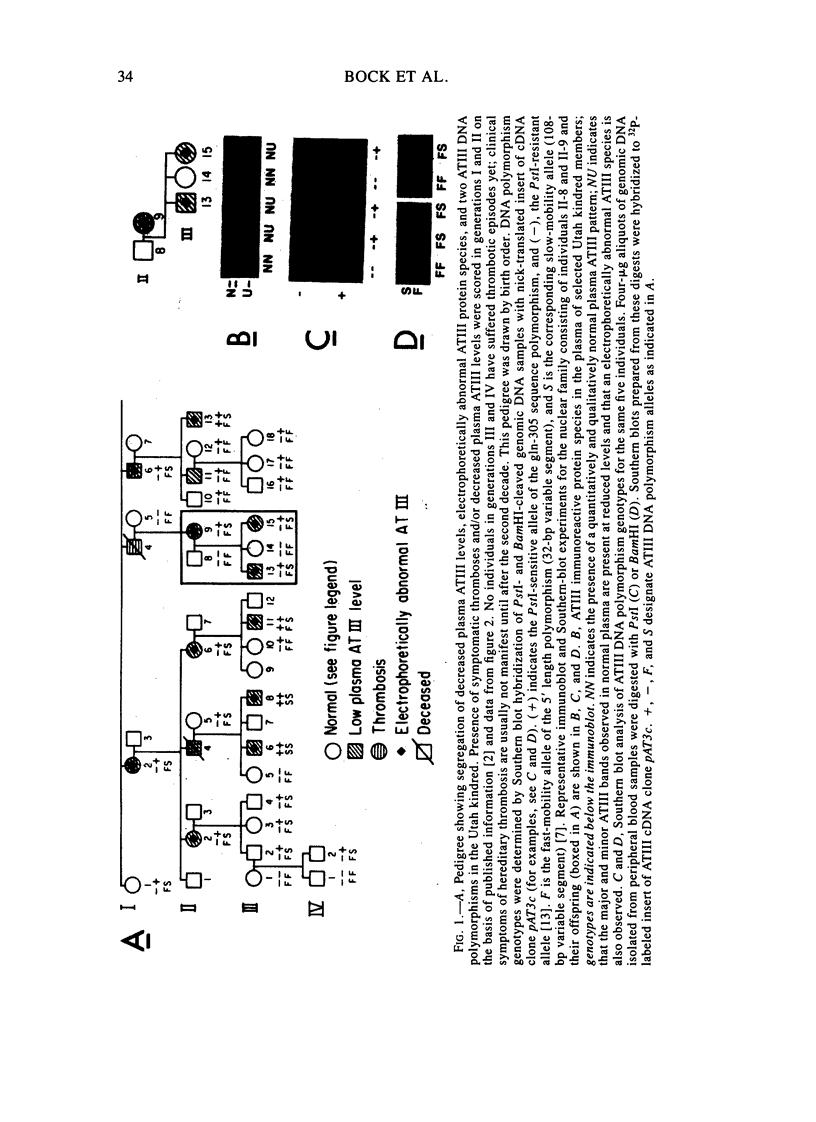
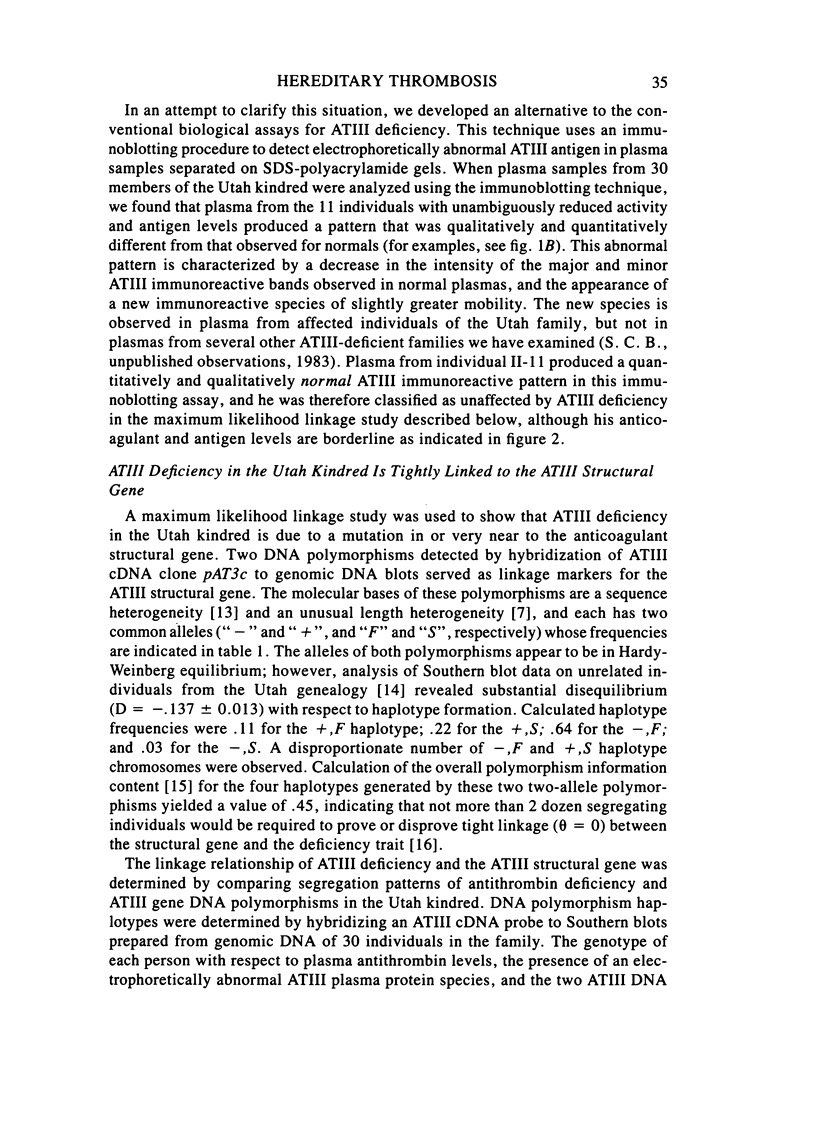
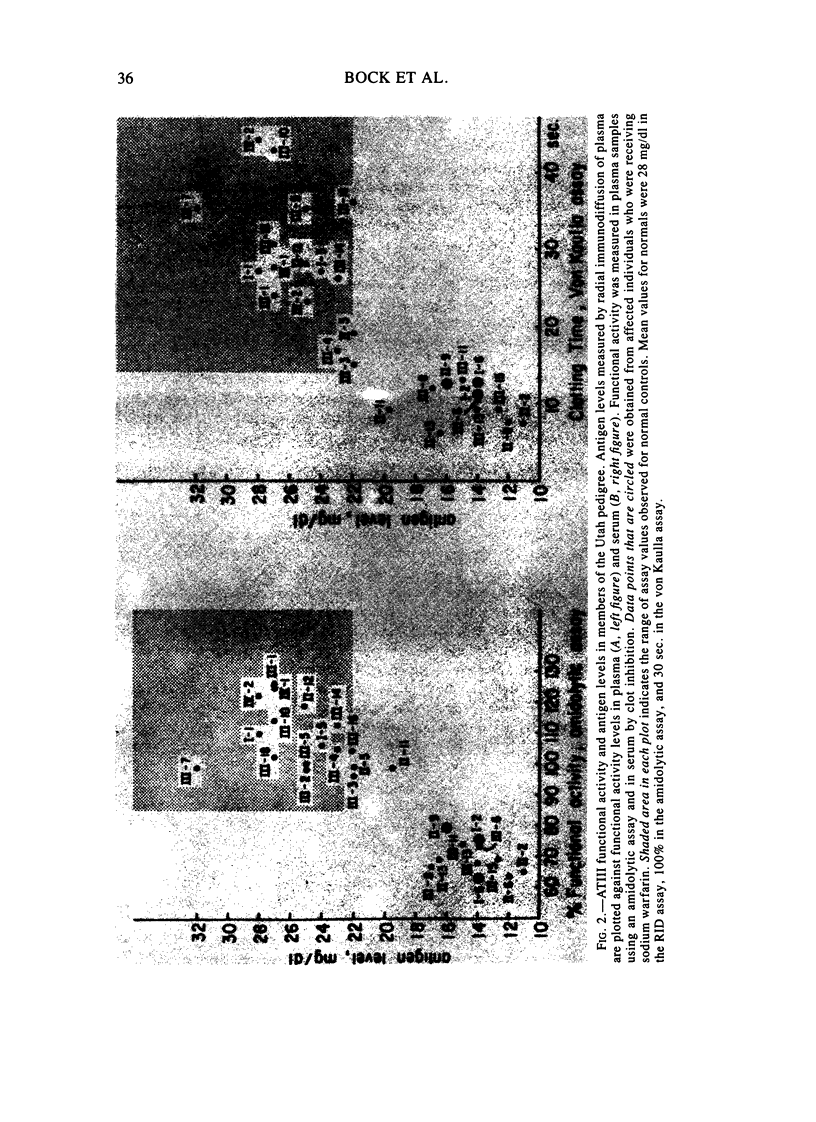
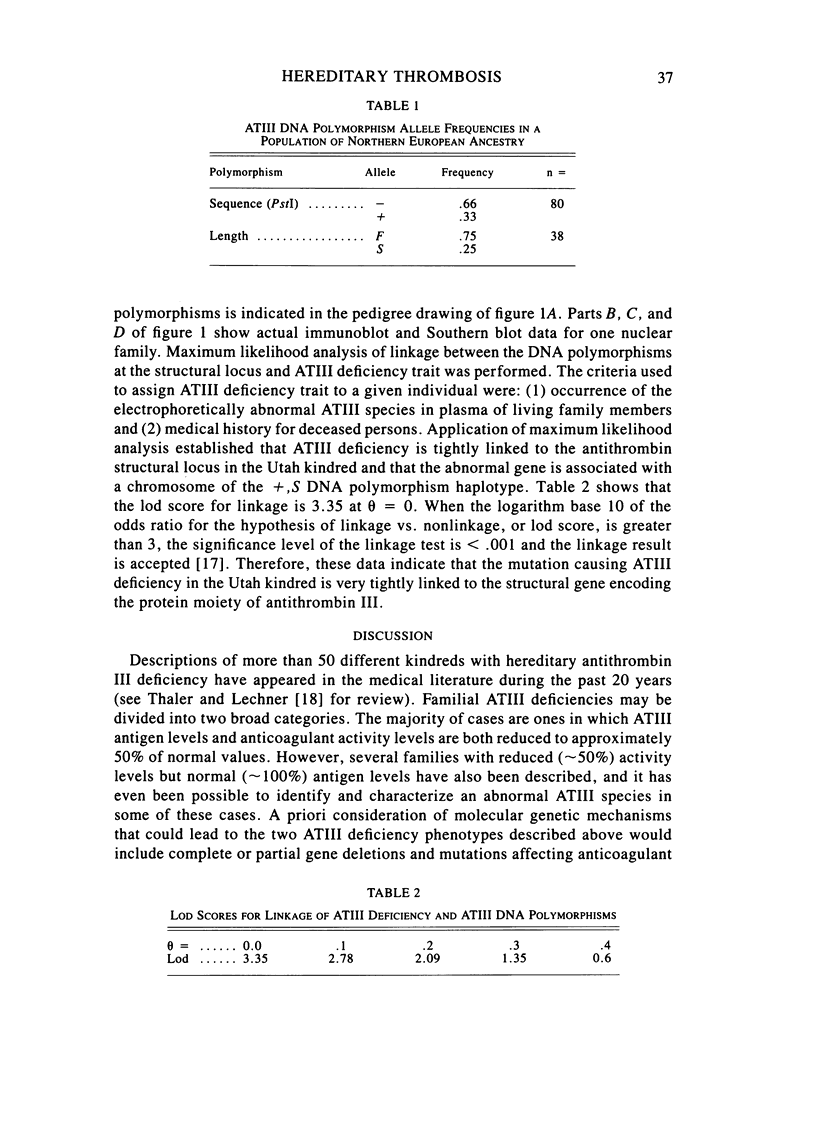
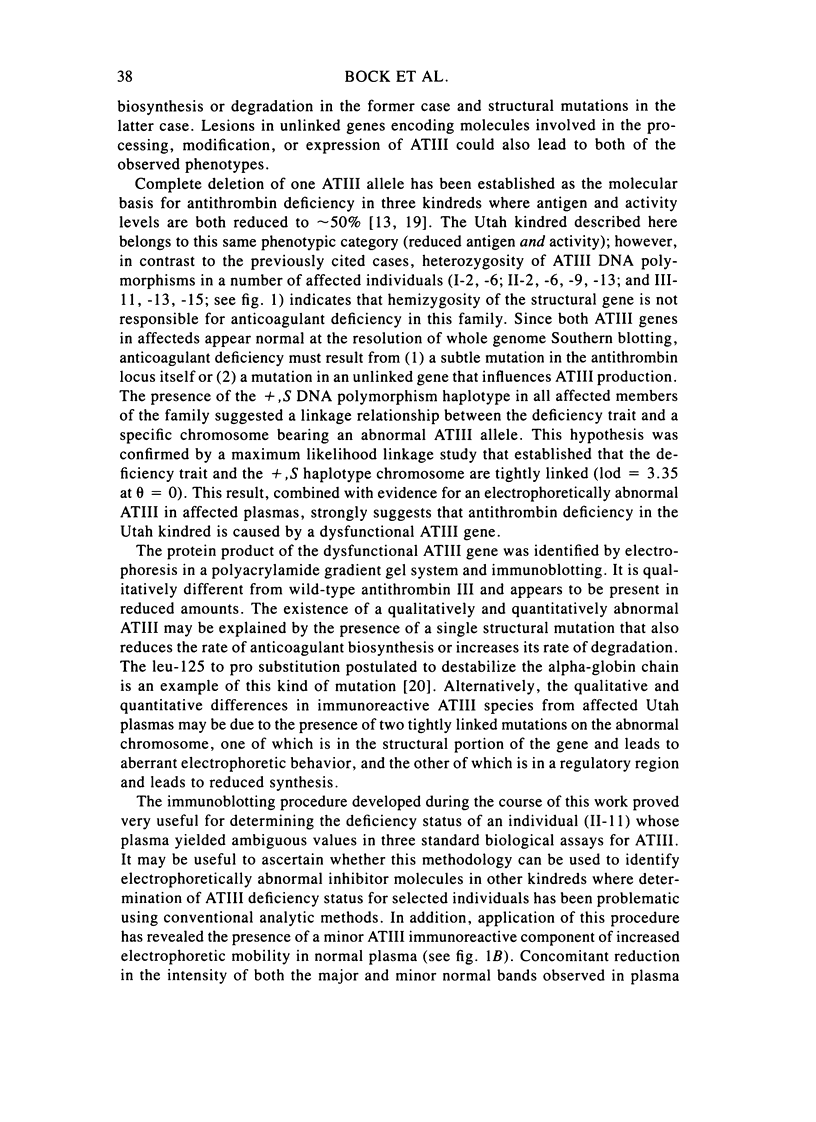
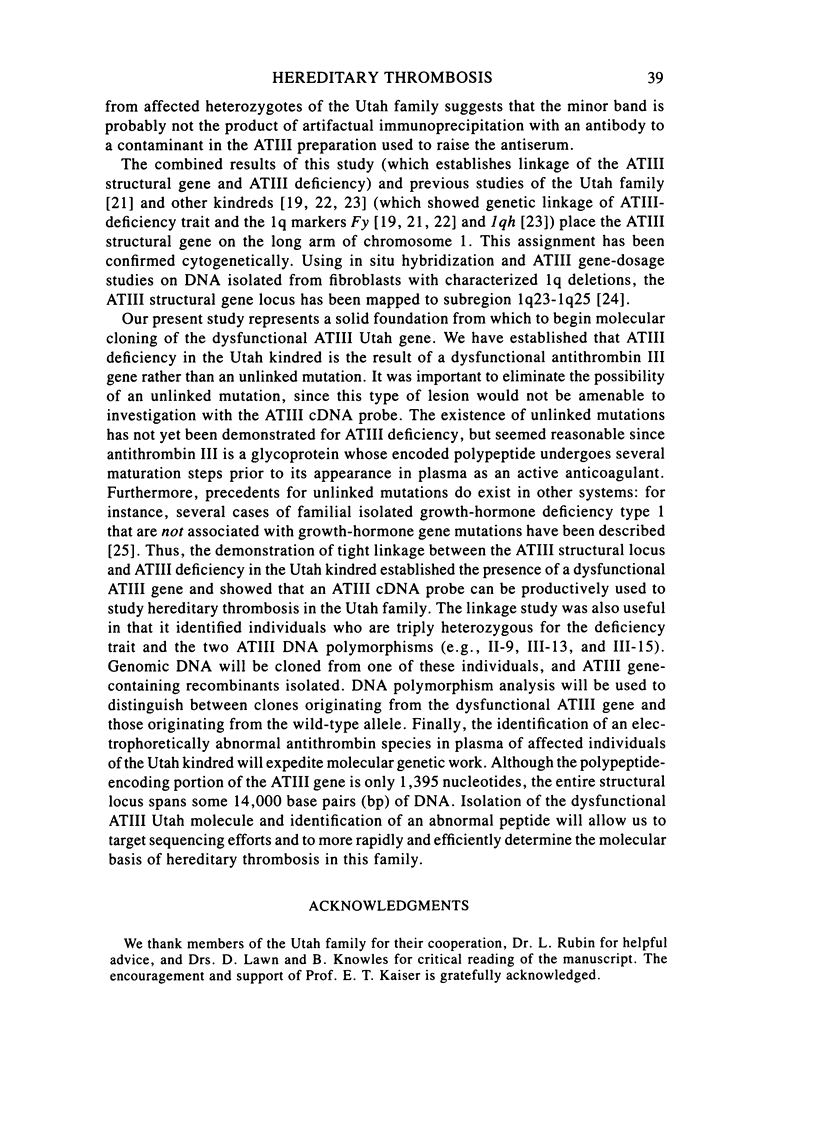
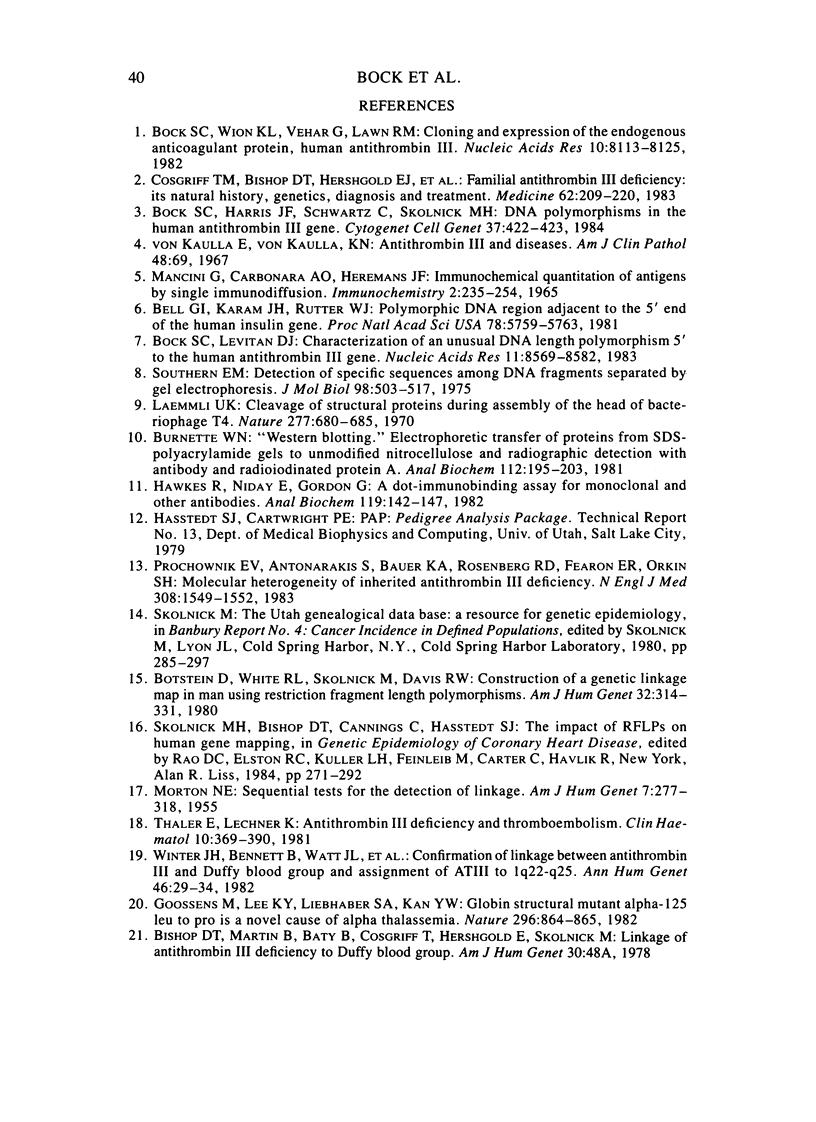
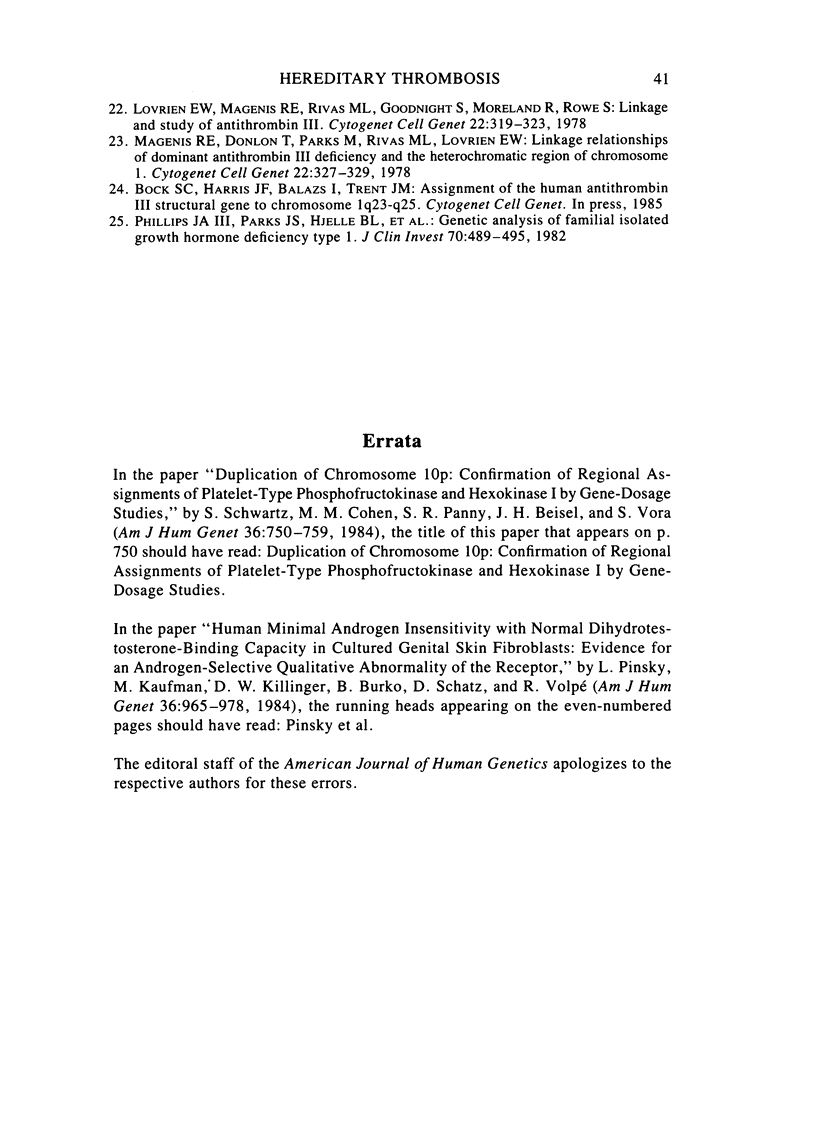
Images in this article
Selected References
These references are in PubMed. This may not be the complete list of references from this article.
- Bell G. I., Karam J. H., Rutter W. J. Polymorphic DNA region adjacent to the 5' end of the human insulin gene. Proc Natl Acad Sci U S A. 1981 Sep;78(9):5759–5763. doi: 10.1073/pnas.78.9.5759. [DOI] [PMC free article] [PubMed] [Google Scholar]
- Bock S. C., Levitan D. J. Characterization of an unusual DNA length polymorphism 5' to the human antithrombin III gene. Nucleic Acids Res. 1983 Dec 20;11(24):8569–8582. doi: 10.1093/nar/11.24.8569. [DOI] [PMC free article] [PubMed] [Google Scholar]
- Bock S. C., Wion K. L., Vehar G. A., Lawn R. M. Cloning and expression of the cDNA for human antithrombin III. Nucleic Acids Res. 1982 Dec 20;10(24):8113–8125. doi: 10.1093/nar/10.24.8113. [DOI] [PMC free article] [PubMed] [Google Scholar]
- Botstein D., White R. L., Skolnick M., Davis R. W. Construction of a genetic linkage map in man using restriction fragment length polymorphisms. Am J Hum Genet. 1980 May;32(3):314–331. [PMC free article] [PubMed] [Google Scholar]
- Burnette W. N. "Western blotting": electrophoretic transfer of proteins from sodium dodecyl sulfate--polyacrylamide gels to unmodified nitrocellulose and radiographic detection with antibody and radioiodinated protein A. Anal Biochem. 1981 Apr;112(2):195–203. doi: 10.1016/0003-2697(81)90281-5. [DOI] [PubMed] [Google Scholar]
- Cosgriff T. M., Bishop D. T., Hershgold E. J., Skolnick M. H., Martin B. A., Baty B. J., Carlson K. S. Familial antithrombin III deficiency: its natural history, genetics, diagnosis and treatment. Medicine (Baltimore) 1983 Jul;62(4):209–220. [PubMed] [Google Scholar]
- Goossens M., Lee K. Y., Liebhaber S. A., Kan Y. W. Globin structural mutant alpha 125Leu leads to Pro is a novel cause of alpha-thalassaemia. Nature. 1982 Apr 29;296(5860):864–865. doi: 10.1038/296864a0. [DOI] [PubMed] [Google Scholar]
- Hawkes R., Niday E., Gordon J. A dot-immunobinding assay for monoclonal and other antibodies. Anal Biochem. 1982 Jan 1;119(1):142–147. doi: 10.1016/0003-2697(82)90677-7. [DOI] [PubMed] [Google Scholar]
- Laemmli U. K. Cleavage of structural proteins during the assembly of the head of bacteriophage T4. Nature. 1970 Aug 15;227(5259):680–685. doi: 10.1038/227680a0. [DOI] [PubMed] [Google Scholar]
- Lovrien E. W., Magenis R. E., Rivas M. L., Goodnight S., Moreland R., Rowe S. Linkage study of antithrombin III. Cytogenet Cell Genet. 1978;22(1-6):319–323. doi: 10.1159/000130963. [DOI] [PubMed] [Google Scholar]
- MORTON N. E. Sequential tests for the detection of linkage. Am J Hum Genet. 1955 Sep;7(3):277–318. [PMC free article] [PubMed] [Google Scholar]
- Magenis R. E., Donlon T., Parks M., Rivas M. L., Lovrien E. W. Linkage relationships of dominant antithrombin III deficiency and the heterochromatic region of chromosome 1. Cytogenet Cell Genet. 1978;22(1-6):327–329. doi: 10.1159/000130965. [DOI] [PubMed] [Google Scholar]
- Mancini G., Carbonara A. O., Heremans J. F. Immunochemical quantitation of antigens by single radial immunodiffusion. Immunochemistry. 1965 Sep;2(3):235–254. doi: 10.1016/0019-2791(65)90004-2. [DOI] [PubMed] [Google Scholar]
- Phillips J. A., 3rd, Parks J. S., Hjelle B. L., Herd J. E., Plotnick L. P., Migeon C. J., Seeburg P. H. Genetic analysis of familial isolated growth hormone deficiency type I. J Clin Invest. 1982 Sep;70(3):489–495. doi: 10.1172/JCI110640. [DOI] [PMC free article] [PubMed] [Google Scholar]
- Prochownik E. V., Antonarakis S., Bauer K. A., Rosenberg R. D., Fearon E. R., Orkin S. H. Molecular heterogeneity of inherited antithrombin III deficiency. N Engl J Med. 1983 Jun 30;308(26):1549–1552. doi: 10.1056/NEJM198306303082601. [DOI] [PubMed] [Google Scholar]
- Skolnick M. H., Bishop D. T., Cannings C., Hasstedt S. J. The impact of RFLPs on human gene mapping. Prog Clin Biol Res. 1984;147:271–292. [PubMed] [Google Scholar]
- Southern E. M. Detection of specific sequences among DNA fragments separated by gel electrophoresis. J Mol Biol. 1975 Nov 5;98(3):503–517. doi: 10.1016/s0022-2836(75)80083-0. [DOI] [PubMed] [Google Scholar]
- Thaler E., Lechner K. Antithrombin III deficiency and thromboembolism. Clin Haematol. 1981 Jun;10(2):369–390. [PubMed] [Google Scholar]
- Von Kaulla E., Von Kaulla K. N. Antithrombin 3 and diseases. Am J Clin Pathol. 1967 Jul;48(1):69–80. doi: 10.1093/ajcp/48.1.69. [DOI] [PubMed] [Google Scholar]
- Winter J. H., Bennett B., Watt J. L., Brown T., San Román C., Schinzel A., King J., Cook P. J. Confirmation of linkage between antithrombin III and Duffy blood group and assignment of AT3 to 1q22 lead to q25. Ann Hum Genet. 1982 Jan 1;46(Pt 1):29–34. doi: 10.1111/j.1469-1809.1982.tb00692.x. [DOI] [PubMed] [Google Scholar]



